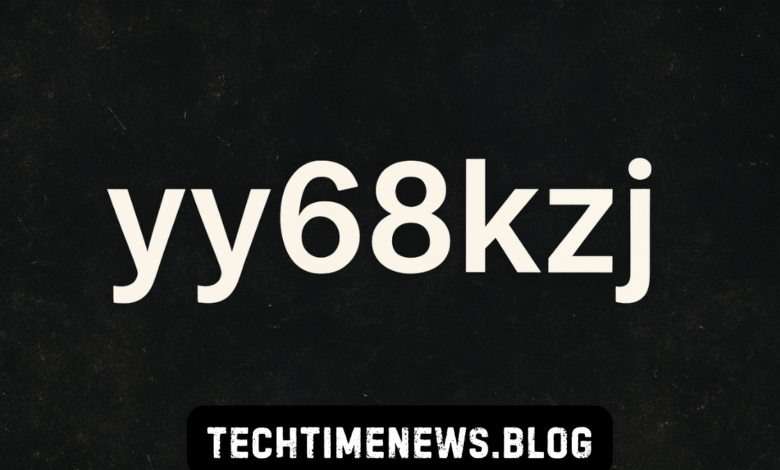Understanding the Term “Yy68kzj”

The term “yy68kzj” appears enigmatic at first glance, a combination of letters and numbers that does not carry an immediate meaning in common language. However, in the world of modern digital communication, online data, and coded identifiers, such terms are far from unusual. They often emerge as unique identifiers, software keys, encrypted tokens, or references in specialized systems. Understanding what “yy68kzj” could represent requires exploring its potential contexts, applications, and significance in today’s interconnected world.
This keyword reflects how modern technology frequently relies on coded expressions to ensure precision, security, and uniqueness. Whether it is a system-generated tag in a database, a component of a larger program, or a placeholder for experimental information, the construction of such a keyword indicates intentionality, even if the exact origin is unclear.
The Nature of Coded Identifiers
Combinations like “yy68kzj” are commonly generated by algorithms to create unique sequences that can be tracked without confusion. Unlike human-readable words, these sequences are designed to avoid repetition and ambiguity. For instance, when large-scale systems require billions of unique records, randomly generated strings of letters and numbers ensure that no two records collide. The seemingly random construction serves an important purpose: to provide structure within complex data environments.
Identifiers like this may also function in cryptographic environments. When systems generate tokens to secure logins or provide authorization, they frequently use such alphanumeric patterns. These are not intended to be memorable but to be resistant to guessing and tampering, enhancing both privacy and security.
Possible Contexts of “yy68kzj” in Technology
When encountering such a keyword, the most likely interpretations arise from fields such as software development, networking, or encrypted communication. It could be a product code, an activation key, or a part of a URL string used to track information. Developers frequently embed similar tokens inside code repositories, application build systems, or testing environments to differentiate versions and verify authenticity.
In some cases, patterns like “yy68kzj” are generated as session identifiers. When a user connects to a website or application, the server may assign a short-lived code that helps it track the user’s activity securely without exposing personal details. This practice keeps sensitive data safe while maintaining functionality.
Moreover, software licensing systems often rely on keys or hashes that resemble “yy68kzj.” These keys help verify whether a user’s software is genuine and licensed properly. They are designed to be difficult to guess, ensuring only authorized users can activate certain features.
The Role of Randomization and Security
The use of alphanumeric strings such as “yy68kzj” demonstrates how important randomness is in computing. In secure systems, random strings reduce predictability. If codes followed simple, predictable patterns, malicious actors could potentially reverse-engineer them. A secure random generator produces sequences without discernible order, making it extremely difficult for attackers to exploit.
Cryptographic systems depend on this principle. While “yy68kzj” itself may not be an encryption key, it reflects the same philosophy: information that appears random to humans is valuable for building secure frameworks. Whether the code relates to software registration, digital certificates, or session validation, its structure highlights the technological preference for unpredictability.
Human Interpretation vs. Machine Use
Humans tend to look for meaning in words and symbols, but machines do not require meaning in the same way. For machines, the efficiency, uniqueness, and integrity of identifiers are far more critical than human readability. A sequence like “yy68kzj” may look nonsensical to people, but to a computer it is simply a precise string that can be compared, stored, and verified at lightning speed.
This is why modern software often uses non-mnemonic identifiers. Unlike human-friendly codes—like “SUMMER2025”—which may be easy to remember but also easy to guess, machine-generated codes are safer and less prone to misuse. They may not tell a story or give an obvious clue about their purpose, but they excel at preventing conflicts and maintaining order in massive data systems.
Applications in Databases and Tracking
Another significant area where identifiers like “yy68kzj” are common is database management. In large networks, millions of records might need to be referenced individually. Developers often rely on auto-generated unique keys to ensure every entry can be accessed directly without confusion.
This code could also represent a tracking parameter in analytics. Companies monitor user activity or product performance through short tokens embedded in web pages or software logs. Such identifiers enable precise reporting while avoiding exposure of sensitive details about users.
By using abstract tokens, organizations maintain both accuracy and privacy. No personal data is attached to the string itself; rather, it serves as a pointer to relevant records stored securely elsewhere.
Symbolic and Experimental Uses
Beyond pure functionality, some developers or researchers deliberately choose random strings as symbolic placeholders. In early testing phases of a project, nonsensical codes like “yy68kzj” may stand in for data yet to be defined. Later, these placeholders can be replaced with actual content or product names, but during initial stages they help structure experiments without influencing outcomes with preconceived ideas.
Such an approach is valuable in creative fields as well. For example, in game design or software prototyping, developers may label characters, objects, or modules with random codes to avoid bias. The label does not hint at any specific feature, giving designers freedom to modify attributes without constraint.
The Broader Cultural Meaning of Random Codes
Even outside technical applications, random sequences like “yy68kzj” have become part of digital culture. Online users sometimes adopt such codes as usernames, tags, or personal signatures because they are unique and unclaimed. Social media platforms, forums, and gaming communities often generate or suggest similar handles when a desired name is already taken.
This trend reflects a broader cultural shift where digital identity does not always need to resemble real-world identity. People can express creativity or anonymity by adopting identifiers that have no inherent meaning but still provide a sense of individuality.
The Importance of Uniqueness in the Digital Era
At its core, “yy68kzj” represents a principle vital to modern computing: uniqueness. Every transaction, every record, every digital event benefits from an identifier that clearly distinguishes it from all others. Whether for verifying access rights, organizing complex databases, or simply keeping systems from getting confused, unique tokens are fundamental.
This uniqueness becomes even more critical as digital ecosystems expand. With billions of users, devices, and programs operating simultaneously, ensuring that each element can be referenced without error is non-negotiable. A single duplicated identifier could lead to malfunction, data loss, or security breaches.
Potential Research Implications
While “yy68kzj” itself may not correspond to a known product or widely recognized code, studying its structure reveals broader insights into how technology handles information. Researchers exploring data security, cryptography, or distributed systems often analyze such identifiers to understand how randomness is generated, stored, and verified.
It also raises intriguing questions: How truly random are these codes? Are they produced by deterministic algorithms or by physical random number generators? What level of entropy ensures that no two codes will ever collide? Exploring these questions deepens our understanding of cybersecurity and data integrity.
Looking Toward the Future of Digital Identification
As technology continues to advance, identifiers like “yy68kzj” will only become more prevalent. In an era dominated by the Internet of Things, artificial intelligence, and decentralized systems, the demand for unique, secure, and machine-friendly codes is skyrocketing. Devices from household appliances to autonomous vehicles must all have distinct identifiers to communicate without confusion.
Moreover, advancements in quantum computing may reshape how such identifiers are generated and secured. Systems may eventually move from simple Yy68kzj sequences to more sophisticated quantum-safe keys, but the underlying goal will remain unchanged: ensuring that every piece of data or hardware has a trustworthy digital fingerprint.
Conclusion
The keyword “yy68kzj,” while mysterious on its surface, represents an important concept in the digital age. It embodies the drive for uniqueness, security, and precision in information systems. Whether serving as a product code, a placeholder, or a cryptographic token, it reflects the essential role that random, machine-generated identifiers play in modern computing.



